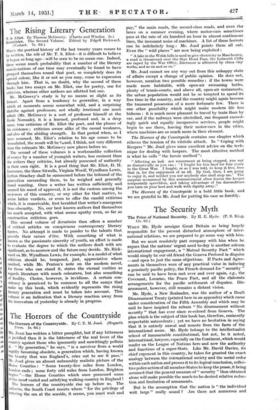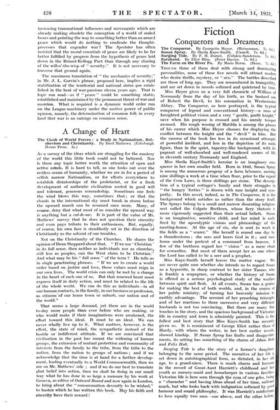The Security Myth
WHEN Mr. Hyde arraigns Great Britain as being largely responsible for the present disturbed atmosphere of inter- national relations, we are prepared to go some way with him.
But we must resolutely part company with him when he argues that the nations' urgent need to-day is another solemn international engagement, a " Mutual Security Pact " which would simply be our old friend the Geneva Protocol in disguise —and open to just the same objections. If Pacts and Agree- ments in themselves were of any practical value in inducing a genuinely pacific policy, the French demand for " security " can be said to have been met over and over again, e.g., the Covenant, Locarno, the Peace Pact, and all the elaborate arrangements for the pacific settlement of disputes. Dis- armament, however, still remains a distant vision.
Mr. Hyde, a New Zealander, was the author of a Draft Disarmament Treaty (printed here in an appendix) which came under consideration of the Fifth Assembly and which may be said to have inspired the refrain " No disarmament without security " that has ever since re-echoed from Geneva. The plan which is the subject of this book has, therefore, eminently respectable antecedents ; yet we have no hesitation in saying that it is entirely unreal and remote from the facts of the international scene. Mr. Hyde belongs to the intellectualist school of innumerable constitutional, but not, be it noted, international, lawyers, especially on the Continent, which would confer on the League of Nations here and now the authority and functions of a super-State. Like Mr. David Davies, its chief exponent in this country, he takes for granted the exact analogy between the international society and the social order within each nation and presses it to its logical conclusion, collec- tive police action of all member-States to keep the peaee, it being assumed that the general measure of " security " thus obtained alone will make possible the much-to-be-desired relative reduc- tion and limitation of armaments.
But is the assumption that the nation is " the individual writ large " really sound ? Are there not numerous and
increasing transnational influences and movements which are already making obsolete the conception of a world of sealed boxes and pointing the way to something better than an armed peace which would do nothing to eradicate the thought- processes that engender war ? The Spectator has often insisted that the moral essentials of peace are likely to be far better fulfilled by progress from the hypothesis of peace laid down in the Briand-Kellogg Pact than through any chasing of the will-o'-the-wisp of " security." It is not necessary to traverse that ground again.
The maximum translation of " the mechanics of security," in Mr. J. L. Garvin's phrase, proposed here, implies a rigid stabilization of the territorial and national status quo estab- lished in the • heat of war-passions eleven years ago. That is logic run mad—as if " peace " could be something static, established and maintained by the permanent threat of war and coercion. What is required is a dynamic world order run on the League machinery under the motive power of public opinion, namely, the determination of common folk in every land that war is an outrage on common sense.
























































 Previous page
Previous page